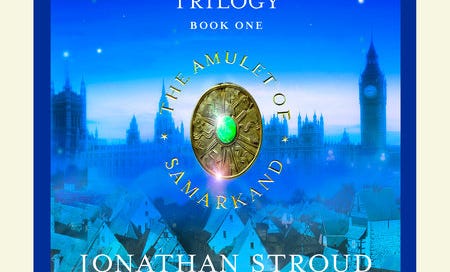Book Review: The Amulet of Samarkand, by Jonathan Stroud
Reviewing a book I first read decades ago
About a year ago, I got a book that I knew my wife would enjoy, if I could only get her to read it. Despite what I consider to be exceptional literary craftsmanship, the Bartimaeus Trilogy by Jonathan Stroud - the first book of which is the focus of today’s post - has never gained the level of acclaim and chatter that even its closest children’s lit cousins like Artemis Fowl have. (To say nothing of behemoths like HP or the lightning thief).
The problem is that getting my wife to try things that she’s not interested in to begin with requires some doing. So I plotted.
I brought the book along on a road trip that we undertook together, and when she got bored, I offered to read aloud to her from this book that I had coincidentally brought along.
This book follows a formula beloved by many a children’s book novelist but does so with higher stakes and more honest daring, and it’s one of my all-time favorite books, even including the adult ones. It follows a 12-year-old boy, Nathaniel, who summons a djinn, the eponymous Bartimaeus, to exact revenge on a powerful adult. Approximately half the book is written from Bartimaeus’ perspective, and I owe conservatively like 20% of my personality to this incredibly annoying, wise-cracking magical entity who was written to appeal to the sensibilities of 12-year-old boys who think they’re clever. I’m not nearly as sorry as I should be for being a poor copy of an over-confident cartoonishly sarcastic vaguely male demon from a 20 year old children’s book. I do think you should read this book - that is, after all, why I wrote this review - and if you do please begin with my apologies for the fact that you will detect elements of my style in half the narration, just better executed.
There’s no reason you, a person who knows me from cranky, under-researched blog posts or tweets on the internet, would know this, but I love to attempt an accent and a funny voice. Reading aloud is a joy for me because I like to see if I can craft consistent voices for all major characters. I love British authors because I love an author who brings a lot of flavor and texture to his bit characters. This is basically required in England. I think they reject British authors if they don’t write at least one character who speaks in a near-illegible UK accent, detectable in dialogue littered with creative spellings and an apostrophe in at least every other word, which you, the [American] reader are required to decipher on your own. I’m pretty sure this is an uncomfortable class thing that is mostly opaque to my ugly American ass, which is nice because that means I can enjoy the fun of these silly little accent-having characters without thinking very hard. I can even be completely wrong about what part of the UK they’re from with no one the wiser.
Reason number one that I love the Amulet of Samarkand: many opportunities to adopt a grotesque, uneven Cockney accent that occasionally pulls Manchester or Scouser in affect - because I have no control over myself - while voicing characters that have under 20 lines of dialogue, many of them shopkeepers or lower Other Place entities like imps and foliots. Another pleasant element of this book is the time spent dipping its toes into BCE biblical and early Grecian and near-Eastern history. References to Tyco Brahe, Ptolemy, Sennacharib, and Solomon litter the pages narrated by our djinn, who can’t stop humble bragging that these people are his exhausting former bosses. (And some authentic whingeing here too - Bartimaeus makes clear that this arrangement is more like slavery than true employment).
Another of my favorite features of this novel (and its sequels! The second is a particular favorite of mine) is the characterization of Nathanael. Unlike Bartimaeus, who in his constant shapeshifting appears to have remained the same for centuries, Nathanael is a growing human boy who consistently learns that being daring and clever will not provide protection from adult consequences. Nathanael is drawn with a loving but honest eye - someone who appreciates him for his precocity and decisiveness, but who also knows their character well enough to know how often those traits can lead to catastrophe, arrogance, and poor judgment. Nathanael is respected by this novel in a way that few protagonists of his age ever are, in part because Bartimaeus is our primary lens on the boy. Bartimaeus is unsparing with Nathanael’s faults and incapable of ignoring Nathanael’s real skills - the two often coincide, after all.
I’m writing a review as limited on spoilers as I can, because I genuinely don’t want to ruin some of the best bits of this novel for you and I genuinely want you to read it. If you do, please tell me what you think!
My wife, for the record, loved it.




Completely agree about this series, and the wonderful array of voices to imitate! Have you tried reading “wee free men” (Terry Pratchett) aloud? Lots of great accents to get completely wrong!
Was a massive fan of the trilogy lol
Was impressed at how much Jewish lore Stroud picked up on, I imagine most readers missed most of the references